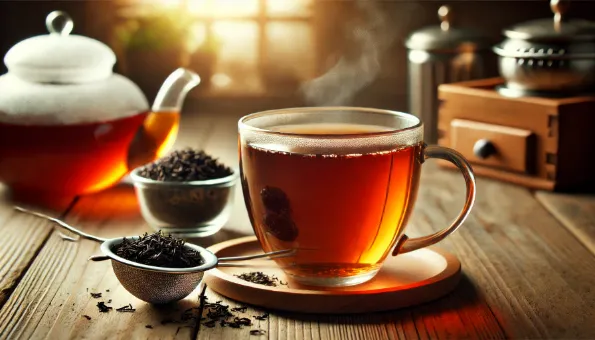Black Tea: Bold and Antioxidant-Rich
Fully oxidized tea leaves with a robust flavor and moderate caffeine—rich in theaflavins, thearubigins and polyphenols.

What Is Black Tea?
Black tea is made from **Camellia sinensis leaves** that are fully **oxidized**, giving them a dark color and robust, malty or floral flavor. Popular types include Assam, Darjeeling, Earl Grey and English Breakfast.
Nutrition & Compounds
Per 240 ml brewed (unsweetened): **~2 kcal**, virtually no macronutrients. Rich in **polyphenols**: theaflavins and thearubigins (antioxidants). Contains **~40–70 mg caffeine** and **L-theanine** which may promote calm alertness.
Health Benefits
- **Antioxidants:** may support heart health.
- **Mental focus:** caffeine + L-theanine combo.
- **Gut health:** polyphenols support beneficial microbiota.
- **Hydration:** counts toward daily fluid intake.
Possible Downsides
- **Caffeine sensitivity:** may cause jitters or insomnia.
- **Iron absorption:** tannins can reduce non-heme iron absorption—avoid drinking right with iron-rich meals.
- **Tooth staining:** prolonged use can darken enamel.
How to Brew & Enjoy
- Steep **1 tsp leaves** in hot water (~95°C) for 3–5 min.
- Serve plain, with **milk/lemon**, or chilled as iced tea.
- Flavor with **spices (chai)** or **bergamot oil (Earl Grey)**.
Tip
Don’t over-steep—bitterness increases. For less caffeine, do a quick **30-sec rinse**, discard, then re-steep.
- 1. Black Tea
Black tea – oksidirani listovi biljke Camellia sinensis; tamne boje, punog ukusa, sadrži kofein; koristi se kao napitak (čaj), može se piti čist, s mlijekom, limunom ili začinima

